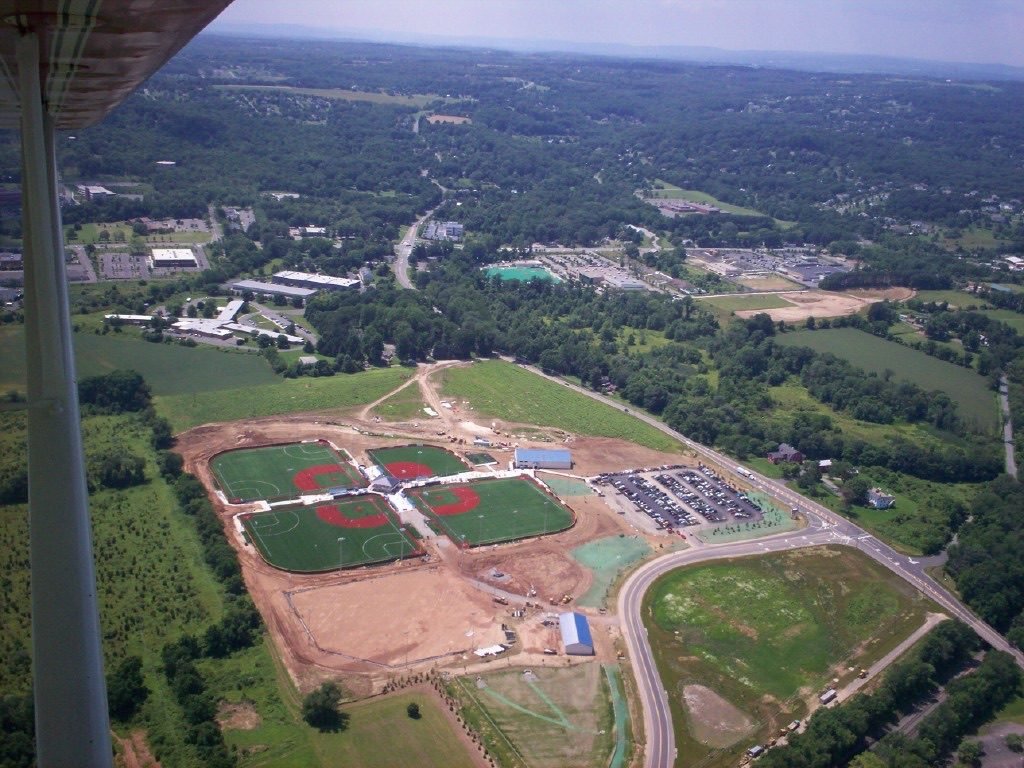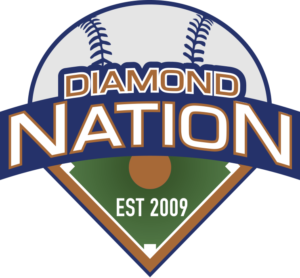(This story also appears in the latest edition of Diamond Nation Magazine, which celebrates the 10th Anniversary of Diamond Nation).
The dream that spurred the construction of Jack Cust Baseball Academy on the property adjacent to Healthquest Fitness Center in Flemington, N.J. would, a few years later, spawn the development of the largest and best all-turf baseball and softball complex in the Northeast.
It wasn’t that Jack Cust, Sr. and Jack Cust, Jr. saw a need they believed needed to be filled as much as they couldn’t stand that New Jersey ball players were being left behind in comparison to players in the warmer southern and western states.
The two Jacks had seen so much talent around the state of New Jersey as players and, in Jack, Sr.’s case, as a skilled hitting instructor. But something was missing in a formula to that point that had left so many talented players looking for more.
“There were a lot of talented athletes,” said Jack Cust, Jr., “but a lack of facilities for players to hone their skills on a year-round basis. I really felt the kids in the northeast were being shortchanged. We wanted to do everything we could to help them.”
Indeed, the story of Diamond Nation, which celebrates its 10th Anniversary this year, cannot be told without the back story. That backstory is the inception of Jack Cust Baseball Academy and what was truly a dream of the Cust family to turn athletes in the northeast into viable competitors with their southern and western counterparts.
The Custs built Jack Cust Baseball Academy in December 1997 to provide indoor instruction and training during the cold winter months. This was no half-hearted operation and it was one with a very serious plan for the present and a vision for the future. The academy immediately implemented the Jack Cust Hitting School and Hitting Philosophy.

Less than three years later, in June of 2000, a turf field was constructed next to JCBA. Every improvement or addition to their baseball academy seemed to ignite more ingenuity in the Custs. Mike Cust, the present assistant general manager of Diamond Nation, recalls a phone call he received from his dad in the fall of 2003. Mike Cust was still a student and player at Seton Hall University.
“My dad said, ‘We’re putting a dome up at JCBA.’ I was like, what?”
By December of 2003, a 130,000 square foot sports dome — to become known as the Healthquest Sports Dome — rose above Flemington on the north side of Route 31. Jack Cust Baseball Academy and its accompanying sports dome quickly became a go-to training site for serious ball players aged 10-18 in the cold, unforgiving months of November-through-March.
Winter leagues sprouted at the Dome and the level and depth of instruction and training naturally exploded as players had the freedom to hit, field, throw and run to their hearts’ desire.
The spring and summer months at JCBA’s new turf field had already seen a steady flow of baseball talent, but there was a problem. One field wasn’t going to come close to meeting the needs of the flow of players and teams that wanted in.
Jack, Sr., who played at Seton Hall University, and Jack, Jr., drafted in the first round out of Immaculata High School in 1997 by the Arizona Diamondbacks, didn’t have to look far in their desire to expand. A short walk from JCBA and on the corner of Bartles Corner and River Road stood a parcel of land that seemed to be begging for baseball and softball.
The Custs didn’t look at the 35-acre parcel as an opportunity for modest expansion of JCBA. They sensed a real opportunity to create something that was unique, the very first in New Jersey and, indeed, the northeast. By the summer of 2009, Diamond Nation rose from a pasture in rural Hunterdon County. And with it came earth-shaking change to the sport of travel baseball and softball in the northeast.
The 35-acre layout boasted six artificial turf playing fields — four large fields and two Little League-sized fields — 12 indoor and outdoor batting cages and 28 bullpens. The main building at the entrance to the complex included a retail shop and reception area. In the middle of the complex stood a large structure called the Scout Tower, where scouts could view four fields from a second floor vantage point. Those facilities are thriving today as nearly 3,000 teams utilize Diamond Nation annually.
The inclusions of the smaller fields for the younger-aged baseball players also accounted for the great sport of softball being a major part of the Diamond Nation family. So, the Custs reached out to the undisputed queen of American softball, Olympic gold medalist Jennie Finch. When Diamond Nation’s doors opened in June of 2009, Jack Cust Baseball Academy had indeed formed an alliance with Finch to create the Diamond Nation-based Jennie Finch Softball Academy.
“This is truly a dream of mine, to have my own academy and for it to have a home here on the East Coast,” said Finch a couple months prior to the facility’s grand opening.”
The growth of Diamond Nation since that opening 10 years ago is truly staggering, to the point that it has created significant economic growth, be it new retail stores, restaurants or hotels in Hunterdon and Somerset counties.
“We have experienced tremendous growth over the last 10 years,” says Diamond Nation’s general manager Nick Massari. “We now employee more than 250 people on a yearly basis. While many of these are seasonal employees, we have expanded our administrative staff as well.”
Diamond Nation had a jump start thanks to the positive experience its customers were having at Jack Cust Baseball Academy. But it still had a long way to go and a lot of hard work ahead to fill its shining new complex with teams.
“I would say there were a lot of failed attempts, but also some pretty successful attempts, as the timing of when I started was pretty crucial to filling up our fall events that year,” said Mike Cust. “I started in August of 2009, so my goal was to fill the tournament as much as I could. I did a pretty good job filling up about 75 percent of the inventory of 400 plus teams.”
Building a business from the ground up is never easy and it is certainly a series of starts and stops.
“In the first half of our existence,” says Massari, “we had a couple people wearing a lot of different hats, which was great as we gained a true perspective on the business and how to operate it. Once our tournaments and our own teams and programs really took off it enabled us to start structuring departments, headed by individual directors, which quickly took us to another level.”
Diamond Nation was now at the point where it was running on all cylinders, finely tuning and strengthening its marketing, sales and frontline service. “We felt at that point we could spend more time looking at the overall industry to see how we needed to adapt or create new events and programs in order to stay ahead of the curve,” said Massari.
As competitors, large and small, sprung up in the northeast, Diamond Nation was no longer the only “turf” game in town.
“Our biggest challenge at the 10-year mark,” says Massari, “is simply stated as, ‘turf is not enough.’ What I mean by that is, we’ve seen many private turf fields and public turf facilities, especially in the northeast, popping up the last couple years. What separates us is no longer just turf. We have to be more than that.”
Massari says Diamond Nation must be a total experience from the minute our customers walk in the door to the minute they leave, and thereafter. “This means providing them with the x-factor, such as exceptional customer service, cool gear in our pro shop, great food options, unique awards, live-streaming games, social media communication, and news articles on our website.
“And as we enter the 2019 season, our customers can look for the start of some big upgrades to the Diamond Nation campus.”

